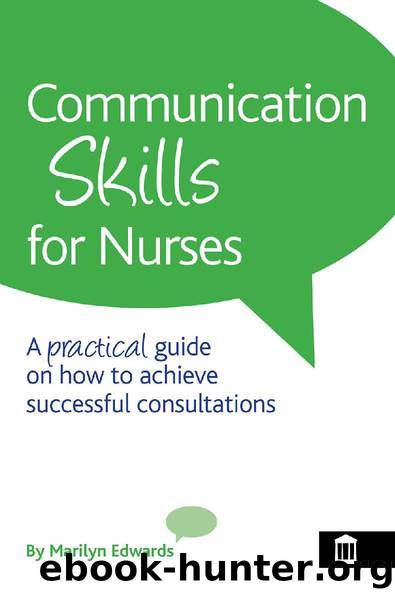Communication Skills for Nurses by Marilyn Edwards

Author:Marilyn Edwards
Language: eng
Format: epub
Tags: nursing, communication skills, patient-centred care, verbal communication, non-verbal communication, disability, barriers to communication, ethics, minority groups, confidentiality, children, adolescents
ISBN: 9781856424967
Publisher: Andrews UK Limited 2014
Published: 2014-11-19T00:00:00+00:00
Children aged 16 and 17
Once children reach the age of 16 they are presumed by law to be competent to give consent for medical treatment (Department of Health, 2001). It is good practice to encourage young people to involve their parents/carers in decisions about their care, but confidentiality must always be respected. However, in cases where the child is at risk, for example from abuse, the nurse must disclose this information with the relevant authorities (NMC, 2008).
Children are dependent on their parents or carers for their health and safety. Most parents look to health professionals to help them make the right choices to ensure that their children grow up with healthy lives. The Best Interest Standard refers to the legal assumption that parents act in their children’s best interests (Beauchamp and Childress, 2001). To be able to consent, a parent must have sufficient information to weigh up risks and benefits of a procedure. Failure to provide this information may lead to the consent being invalid.
It is not uncommon for a minor to refuse treatment, for example an immunisation, but for the parent to give consent. Legally, if the parents have given consent the nurse may give the injection, although forcing the child to be immunised against his will can be construed as criminal assault. If the child fully understands the implications of the vaccine and has a valid reason for refusing, the nurse should heed the child’s request. See scenario 3.
Scenario 3
Amanda, aged 17 years, attended the asthma clinic for her annual review accompanied by her mother. The nurse noticed that she had only had one measles, mumps and rubella (MMR) vaccine. She explained that the recommendations are for two injections, discussed the rationale for this and that she appeared to have missed the second injection. The nurse also explained the dangers of a woman contracting rubella in pregnancy and offered to give the injection during the consultation. Amanda’s mother encouraged her to have it, but Amanda said she was not prepared for it and refused. The nurse respected Amanda’s decision, but gave her a leaflet about the MMR and suggested she came during the next school holidays.
Download
This site does not store any files on its server. We only index and link to content provided by other sites. Please contact the content providers to delete copyright contents if any and email us, we'll remove relevant links or contents immediately.
| Administration & Medicine Economics | Allied Health Professions |
| Basic Sciences | Dentistry |
| History | Medical Informatics |
| Medicine | Nursing |
| Pharmacology | Psychology |
| Research | Veterinary Medicine |
The Daughter's Return by The Daughter's Return(1792)
Elizabeth Is Missing by Emma Healey(1659)
1610396766 (N) by Jo Ann Jenkins(1659)
Economics and Financial Management for Nurses and Nurse Leaders, Third Edition by Susan J. Penner RN MN MPA DrPH CNL(1508)
McGraw-Hill Nurses Drug Handbook by Patricia Schull(1488)
Home. by Sarah Graham(1426)
Cherry Ames Boxed Set, Books 1 - 4 by Helen Wells(1424)
NCLEX-RN Prep Plus 2019 by Kaplan Nursing(1404)
The Language of Kindness by Christie Watson(1375)
Spiritual Midwifery by Ina May Gaskin(1363)
Cherry Ames, Student Nurse by Helen Wells(1361)
NCLEX-RN Prep 2019 by Kaplan Nursing(1354)
Cherry Ames Boxed Set, Books 5 - 8 by Helen Wells(1338)
Whoever Tells the Best Story Wins: How to Use Your Own Stories to Communicate with Power and Impact by Annette Simmons(1297)
Cracking the Nursing Interview by Jim Keogh(1292)
1476763445 by Liz Fenton(1256)
Global Diversity Management by Unknown(1246)
Getting Started with Arduino by Massimo Banzi(1230)
Dementia by June Andrews(1208)
